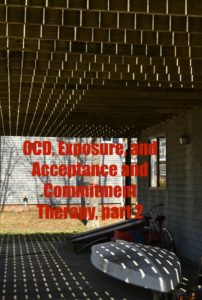 Exposure, facing what you fear the most, in a gradual, supported way, is the key treatment for OCD. It may involve writing scripts about feared outcomes and rereading them repeatedly, or tolerating an environment that feels disorganized in some profoundly disturbing way. Always it is specifically tailored to your particular anxiety. A trained therapist helps to fine-tune the exposure planning and get you started actually doing the exposures.
Exposure, facing what you fear the most, in a gradual, supported way, is the key treatment for OCD. It may involve writing scripts about feared outcomes and rereading them repeatedly, or tolerating an environment that feels disorganized in some profoundly disturbing way. Always it is specifically tailored to your particular anxiety. A trained therapist helps to fine-tune the exposure planning and get you started actually doing the exposures.
Acceptance and Commitment Therapy for OCD always includes exposure (ERP).
ACT teaches all of us ( not just those with OCD) to “defuse” from our thoughts. The ability to make abstract associations (eg. a picture of an apple = an apple) fuels much of human achievement, but also makes us vulnerable to being “triggered” by our anxiety and depression. A picture of a spider causes physical reactions in people with spider phobia. A door knob in a public bathroom can be so strongly associated with HIV by a person with OCD that it takes enormous courage for him to touch it. “Defusing” from our thoughts means recognizing them as coming from our own minds rather than from objective reality.
“Logic” appears to support many of our associations. There’s a quick test to determine whether this is true. Would a “regular”, non-obsessive, or non-depressed, or non-anxious person, react the same way I am reacting? There is of course a miniscule possibility that an HIV-infected person with bleeding hands just rubbed the doorknob, and I with my cut hand may contact the virus. How likely is that, really? The logic of “regular” people does not include zero tolerance for uncertainty, but obsessive logic always does. This technique can be adapted to apply to peer groups that share the person’s values, as in “Would most devout………….believers agree with your logic here?”
ACT teaches us that what goes on in our minds is a set of “private events”, enchained with our past and our fears about the future. It’s our “stuff”, baggage that gets in the way of our perceiving our real lives. We all have it, and when we learn to recognize its patterns it is much easier to learn to disengage from it. This works for everyone, including people with OCD. It helps to externalize the thought contents. – Is this me or my OCD talking?
ACT helps increase people’s motivation to face exposure treatment, because it is about values. A value is not a goal, like earning a degree or getting married. If you value education and a loving intimate relationship, your actions in pursuit of them have meaning, regardless of what the actual outcomes may be. Values are life directions. They are also unique to each person. – For example, some people care deeply about the environment and little about spirituality, others the reverse, and some people care deeply about both.
We use discussion of values in ACT to help the client realize what he or she is missing. What would you be doing with your life if this behavior (physical and mental) was not getting in your way? What are the pros and cons of changing? Of NOT changing? (There are always apparent “pros” to not changing, and “cons” to changing, or you would change.)
It can be a hard road sometimes for people to find/remember their values. It may take perseverance to help the person find something he or she wants enough to motivate him or her for treatment.
Exposure is acceptance, and it will change your relationship to your fears. It’s a lot different to notice what your OCD is telling you (and so be able to disengage from it) than to be grabbed by a terror that causes physical anxiety symptoms.
Gradually, people learn to apply what they learn in exposure sessions more generally. It’s not just that you get used to touching the doorknob. You now recognize that obsessive fears about contamination, being aggressive, “unlucky” numbers, etc., are ALL just your OCD and can, with perseverance and courage, be disregarded.
ACT teaches us that once you recognize your “stuff” it loses much of its power over you, and you are free to chose what you do with your life.
